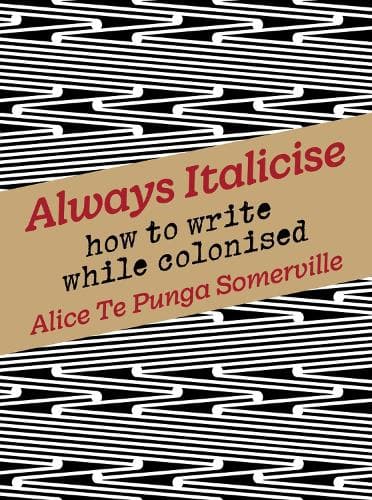Review: Always Italicise: how to write while colonised
Reviewed by primoz2500
If I were to review Always Italicise: how to write while colonised as a tweet it would be a row of fire emojis. Alice Te Punga Somerville’s poetry collection opens with a bang with Kupu rere kē, which sets out her kaupapa of italicising all the English words:
when the foreign words are camouflaged in plain type
you can forget how they came to be there, out of place
…
Now all of my readers will be able to remember
which words truly belong in Aotearoa and which do not.
Daaaaamn, I kept breathing, as the poems kept coming; the rage and the pain honed by years of study and wordcraft. Te Punga Somerville is a scholar and poet from Te Āti Awa and Taranaki and she is done holding back. I first came across the third poem, Rākau, in the Tātai Whetū collection of 2018, where it also appears with a translation into te reo by Te Ataahia Hurihanganui:
We both know a language is waiting inside my tongue.
…
Kei te mōhio tāua, he reo kei tōku arero.
This is followed in Always Italicise by the heart-breaking “red-carded (for a not-to-be-named Māori conference)”:
your nametag is red because you don’t speak your own language
it is not enough for you to hold this secret tightly: everyone must know
…
your grandfather’s humiliation, your mother’s hurt
the inheritance your children won’t be getting
Mad Ave, about gentrification in Tāmaki Makaurau, reminds me of Jessica Hansell’s superb shape-shifting novel How to Loiter in a Turf War (my pick for next year’s Ockhams); both in subject matter and in the use of humour:
i remember the time tasha brought jessie to school
and that principal of ours who’d been so mean and inflexible
during the pregnancy
asked tasha if he could hold baby.
as soon as she was in his arms,
jessie turned her little head
and sicked on his pristine shirt sleeve.
I almost thought I was getting the hang of Always Italicise but then three quarters of the way through I was given an electric shock by Swipe left:
Took Imperialism home for a shag
And what a long night of tangled sheets that turned out to be
…
Gender gets me horny
Gets me to a place where I’m ashamed to be so desperate
…
culture was pretty needy
So now I’ve got class on my speed dial
…
Race likes to do it in public
And though I tried to get extra kicks from the fear of being found out
I was most scared of myself finding me there.
This was one of many toikupu that made me think about Tusiata Avia’s The Savage Coloniser Book, not just in terms of the overall strength and power of both pukapuka but especially this toikupu, room:
there are captain cooks amongst us too – bullies
…
i used to want to tell them to move over because they take up all the room
but there’s no room
…
just links and connections and space
This in turn reminded me of Te Punga Somerville’s essay, Two Hundred and Fifty Ways to Start an Essay About Captain Cook, which I was given to study in a creative nonfiction paper as an example of the capabilities of the form. Both it and room have that same sense of expansiveness, of speaking back to while simultaneously taking apart the premise of the colonisers’ argument.
My copy of Always Italicise bristles with post-it flags and I want to go through the whole pukapuka with you saying, ‘look at this one! Feel the whip-crack of this line with me!’ But we don’t have space. So instead, I recommend you read this pukapuka. At the end of an exhausting year, it is a tonic for the brain, the tongue and the spirit.
Reviewed by Elizabeth Heritage
